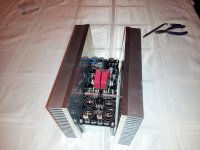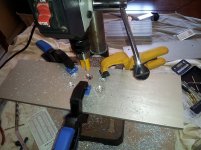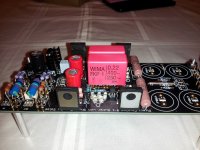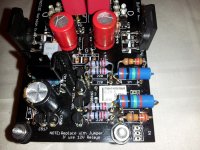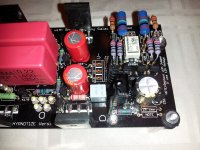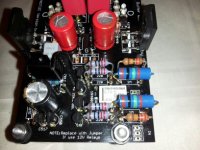Not that big.
Bigger soundstage. Deeper and wider. Sound comes effortlessly/freely into your room. More open. Better detail, deeper bass, with better control and attack.
Thanks for the detailed answer. That is exactly the kind of "big" I like. Now, I just hope 2ohms or 1,25 ohms CCSs are not going to be too much of a good thing since that's what I ordered. We'll see.
Btw, last missing components on their way. Should get everything within a day or two. Can't wait to build the thing and start tryouts. Now, if only I could find a way to put experiments into .wav files and let you hear the results...
Don't have an ADC (only a DAC). Any other ways to do it?
Thanks
Regards
Scorpion
Your laptop/PC has a mic input, but it is pretty lame.
An ADC does not have to be expensive.... something like the EMU0404 is very popular for this. Check it's specs. I don't have one, but I do want one, and others that have them speak highly. Amazon has them, among other sources, like pro audio shops.
It is a DAC as well.
An ADC does not have to be expensive.... something like the EMU0404 is very popular for this. Check it's specs. I don't have one, but I do want one, and others that have them speak highly. Amazon has them, among other sources, like pro audio shops.
It is a DAC as well.
Your laptop/PC has a mic input, b ight give it a try.t it is pretty lame.
An ADC does not have to be expensive.... something like the EMU0404 is very popular for this. Check it's specs. I don't have one, but I do want one, and others that have them speak highly. Amazon has them, among other sources, like pro audio shops.
It is a DAC as well.
Thanks BigE,
The EMU0404 seems like a reasonable quality ADC/DAC. Not too expensive either. So, might give it a try
Scorpion
The beauty of recording each configuration is more than just posterity, you can also switch between them in an ABX tester, and you can use audiodiffmaker to tell just how the signals differ.
I am going to start doing this myself with part upgrades. I mean, if you can't measure a diff, you should not be able to hear one, right?
I am going to start doing this myself with part upgrades. I mean, if you can't measure a diff, you should not be able to hear one, right?
Lots of big plans made here. No results to date. Any progress after several months?
Hi Madisonears,
I am almost there. I want to finish the aluminum casing before starting the resistors exepriments. The ''testboard'' is finished and so is the ''final board'' (just waiting to receive my final resistor choices).
Now, it's not several months in the waiting....I'd say a good 2 months at least though. It took longer to plan everything, draw the final product and receive all the pieces then I initially expected (some pieces were sent to Puerto Rico instead of Canada...go figure...so had to fix it with the parts provider).
Anyway.
My ''starting resistor kit'' is Shinkoh Tantalums at 220R, Audionote Tantalums at 220K and Riken Ohms at 1M.
Should finish the casing and get the thing anodized in 2-3 weeks top.
Here are a few recent pics from last week.
Regards
Scorpion
Attachments
Totally confused, because his memory is playing tricks !
AndrewT
What the heck are you talking about with you memory thing ?
Scorpion
This may seem a bit of a distraction but what is your source/amp/speakers that you're using for your listening for resistor difference evaluation?
The reason for this is that for a particular system setup, the effects of the different resistors under test will have quite specific results
So, if you would be so kind to add your system components/setup, we can then use this for comparing our own systems that will give a better idea of the differences that your testing will produce in our different systems.
For example, when I setup the F5 amp (juma 2013/313) with my Coral beta8 speakers (Xed over at 150Hz) I tended to avoid the brighter sounding Zfoil resistors in the 'forward gain path (used the Rhopoints Econisters) but did use a couple of those power Zfoils in the feedback rather than the Caddocks and this combination really mated up well with the Corals.
However, with the PMC pb1 speakers, the sound was far too 'laid back' as you would expect, and I did substitute the Zfoils in the forward path, etc to achieve my version of audio Nirvana (!)
I would expect a similar preference for particular resistors (in the buffer under test) to suit your different setup so if your system is known, it helps to make a better comparison on other different systems
The reason for this is that for a particular system setup, the effects of the different resistors under test will have quite specific results
So, if you would be so kind to add your system components/setup, we can then use this for comparing our own systems that will give a better idea of the differences that your testing will produce in our different systems.
For example, when I setup the F5 amp (juma 2013/313) with my Coral beta8 speakers (Xed over at 150Hz) I tended to avoid the brighter sounding Zfoil resistors in the 'forward gain path (used the Rhopoints Econisters) but did use a couple of those power Zfoils in the feedback rather than the Caddocks and this combination really mated up well with the Corals.
However, with the PMC pb1 speakers, the sound was far too 'laid back' as you would expect, and I did substitute the Zfoils in the forward path, etc to achieve my version of audio Nirvana (!)
I would expect a similar preference for particular resistors (in the buffer under test) to suit your different setup so if your system is known, it helps to make a better comparison on other different systems
Scorpion, just asking if this thing went off the rails because so many posters come here promising all kinds of testing info and are never heard from again. Of course, everything always takes longer than we expect. Didn't know you were going to finish the entire project before starting testing. Hope you can dedicate time during summer season. My interest usually wanes somewhat with onset of nicer weather.
All absolute qualities are dependent on system and circuit configuration, but one part relative to another is always valid no matter the context. So A may or may not be bright depending on the application or your speakers (or your ears), but is it brighter than B or C? That's the kind of thing we're looking for.
In that sense, I'm not sure tantalums are the best parts to use for a baseline. Why not choose a more commonly used part, such as a decent MF, perhaps Vishay or PRP, or a Takman CF? Then go to exotics. But it's your test...
Peace,
Tom E
All absolute qualities are dependent on system and circuit configuration, but one part relative to another is always valid no matter the context. So A may or may not be bright depending on the application or your speakers (or your ears), but is it brighter than B or C? That's the kind of thing we're looking for.
In that sense, I'm not sure tantalums are the best parts to use for a baseline. Why not choose a more commonly used part, such as a decent MF, perhaps Vishay or PRP, or a Takman CF? Then go to exotics. But it's your test...
Peace,
Tom E
Hi Jameshillj,
Thanks for your comments with wich I totally agree. Obviously, fine tuning will be system dependent to "spice the flavor" according to tastes but always towards best overall balance. That being said, I think that if different people with different systems with different tastes report constantly a specific sound from a given component, then there is most certainly something there...I will just be one of those person. I'll try to do it as thoroughly and honestly as I can. Hope to be of some help to fellow DIYers.
Something worth mentionning though: personnaly, I will always favor musicality before ultimate performance, look for that little "magic" that let me feel the soul of the performance. If a specific component adds the bonus of extra "audiophiles characteristics" such has better soundstage, more controlled and deeper bass, better harmonics and so on...then, it will be the topping on a sundae. BUT, I will never let any of the above distract me from the "magic" that special synergy sometimes (in fact, rarely) brings.
Therefore, you will see in my reports all of the above characteristics ...but I could discard a better performing resistor if it gets in the way of music. If you get my point.
I have had more than my share in the last 20 years or so running after those special "audiophiles beloved sound characteristics" in such a way; that I ended up with almost perfect sound. Very impressive because it bordered on perfection, but still missing that little special "soul" that can sometimes be found even in lesser systems.
I hear that all the time at the yearly Montreal's Festival Son &Image where we hear 200 000 $ worth of perfect sound but NO music whatesoever...I went wrong for years too. Too many in fact, spending too much money along the way....until I was stunned a few years ago while listenning to a system that deeply left his marks on me, for years, with its deeply involving musicality and sheer emotion. I was so stunned because ONLY THEN did I fully understand how I had been running in circles for so long.
2-3 years later- and after years of hearing me rave about the experience- my wife accepted to come give the thing a listen with me. Well, long story short, it brought her to tears ...while we were listenning to a track she heard 50 or 100 times. No kidding !! I initially had hopes (hidden plans ;-) ) to buy the amp. She said: "I want all of it, the total package, or, I am not buying a single screw !!!!
Before that evening's purchase I was a "sound lover", now I have become " un vrai mélomane" (music lover). Before, the music served the gears, now the gears are just a medium...
Ouf...thanks for the long reading.
Cd transport: Audiomat D-1
DAC: Audiomat Maestro 2
Power amp : my own diy dual-mono (replaces Audiomat Opera Reference wich it betters)
Passive preamp: a friend's homebrew (until my hotrodded DCB1 is completed)
Speakers: Equation 25 (replace Duevel Bella Luna Diamante)
Cables: Actinote Aria all around
Wall Outlets: Oyaide R-1 all around
All components have their own dedicated AC lines.
Here is a link to a extremely hard to find infos on the Equation 25 speakers (I do have one of those in-beetween room):
www.uhfmag.com/Issue70/UHF70.pdf
MISSION: Beat the Audiomat Opera Reference in both musicality and performance as I introduce my DCB1 in the system...
Regards
Scorpion
Thanks for your comments with wich I totally agree. Obviously, fine tuning will be system dependent to "spice the flavor" according to tastes but always towards best overall balance. That being said, I think that if different people with different systems with different tastes report constantly a specific sound from a given component, then there is most certainly something there...I will just be one of those person. I'll try to do it as thoroughly and honestly as I can. Hope to be of some help to fellow DIYers.
Something worth mentionning though: personnaly, I will always favor musicality before ultimate performance, look for that little "magic" that let me feel the soul of the performance. If a specific component adds the bonus of extra "audiophiles characteristics" such has better soundstage, more controlled and deeper bass, better harmonics and so on...then, it will be the topping on a sundae. BUT, I will never let any of the above distract me from the "magic" that special synergy sometimes (in fact, rarely) brings.
Therefore, you will see in my reports all of the above characteristics ...but I could discard a better performing resistor if it gets in the way of music. If you get my point.
I have had more than my share in the last 20 years or so running after those special "audiophiles beloved sound characteristics" in such a way; that I ended up with almost perfect sound. Very impressive because it bordered on perfection, but still missing that little special "soul" that can sometimes be found even in lesser systems.
I hear that all the time at the yearly Montreal's Festival Son &Image where we hear 200 000 $ worth of perfect sound but NO music whatesoever...I went wrong for years too. Too many in fact, spending too much money along the way....until I was stunned a few years ago while listenning to a system that deeply left his marks on me, for years, with its deeply involving musicality and sheer emotion. I was so stunned because ONLY THEN did I fully understand how I had been running in circles for so long.
2-3 years later- and after years of hearing me rave about the experience- my wife accepted to come give the thing a listen with me. Well, long story short, it brought her to tears ...while we were listenning to a track she heard 50 or 100 times. No kidding !! I initially had hopes (hidden plans ;-) ) to buy the amp. She said: "I want all of it, the total package, or, I am not buying a single screw !!!!
Before that evening's purchase I was a "sound lover", now I have become " un vrai mélomane" (music lover). Before, the music served the gears, now the gears are just a medium...
Ouf...thanks for the long reading.
Cd transport: Audiomat D-1
DAC: Audiomat Maestro 2
Power amp : my own diy dual-mono (replaces Audiomat Opera Reference wich it betters)
Passive preamp: a friend's homebrew (until my hotrodded DCB1 is completed)
Speakers: Equation 25 (replace Duevel Bella Luna Diamante)
Cables: Actinote Aria all around
Wall Outlets: Oyaide R-1 all around
All components have their own dedicated AC lines.
Here is a link to a extremely hard to find infos on the Equation 25 speakers (I do have one of those in-beetween room):
www.uhfmag.com/Issue70/UHF70.pdf
MISSION: Beat the Audiomat Opera Reference in both musicality and performance as I introduce my DCB1 in the system...
Regards
Scorpion
This may seem a bit of a distraction but what is your source/amp/speakers that you're using for your listening for resistor difference evaluation?
The reason for this is that for a particular system setup, the effects of the different resistors under test will have quite specific results
So, if you would be so kind to add your system components/setup, we can then use this for comparing our own systems that will give a better idea of the differences that your testing will produce in our different systems.
For example, when I setup the F5 amp (juma 2013/313) with my Coral beta8 speakers (Xed over at 150Hz) I tended to avoid the brighter sounding Zfoil resistors in the 'forward gain path (used the Rhopoints Econisters) but did use a couple of those power Zfoils in the feedback rather than the Caddocks and this combination really mated up well with the Corals.
However, with the PMC pb1 speakers, the sound was far too 'laid back' as you would expect, and I did substitute the Zfoils in the forward path, etc to achieve my version of audio Nirvana (!)
I would expect a similar preference for particular resistors (in the buffer under test) to suit your different setup so if your system is known, it helps to make a better comparison on other different systems
Scorpion, just asking if this thing went off the rails because so many posters come here promising all kinds of testing info and are never heard from again. Of course, everything always takes longer than we expect. Didn't know you were going to finish the entire project before starting testing. Hope you can dedicate time during summer season. My interest usually wanes somewhat with onset of nicer weather.
All absolute qualities are dependent on system and circuit configuration, but one part relative to another is always valid no matter the context. So A may or may not be bright depending on the application or your speakers (or your ears), but is it brighter than B or C? That's the kind of thing we're looking for.
In that sense, I'm not sure tantalums are the best parts to use for a baseline. Why not choose a more commonly used part, such as a decent MF, perhaps Vishay or PRP, or a Takman CF? Then go to exotics. But it's your test...
Peace,
Tom E
Hi Madisonears,
Well Tantalums are not a baseline. They are part of a "starting kit" not a "basic kit" (wich they could end up being after listening tests, who knows). Could be any resistors of proper values.
Thing is I only have Shinkoh Tantalums, Vishay Z-foil and Holco H4 at the 220R position (even the Holcos are 232R wich, alone, could make a difference). "Real" 220R are only Shinkohs and Vishays... Not too much to choose from.
But, I will have A LOT of options for the 220K and 1Mega....
Still, I don't want to start inserting resistors in order of prices. I prefer to swap randomly among the ones I bought and give each resistors its own chance to shine. Regardless of price. Experimentations will tell more than anything.
Some friends (music lovers and/or audiophiles) will share the experiences. One of them is a pianist, plays in a band, and, comes from a family where all sisters and brothers are musician. Good to have him share the moments....
Regards
Scorpion
Last edited:
I'm not familiar with most of your system but looked up a couple of reviews and it looks like you wanted both detail and music and must have sorted your room out pretty well - thanks for adding the 'line-up' - obviously, you'll be able to clearly hear the differences in the various resistors!
I've not been a great enthusiast for the tantalum resistors but I was modding an old Croft preamp (England) awhile ago and those AudioNote tantalums were 'just right' for it - so, that saying about 'horses & courses' is still quite valid .....
Personally, I don't think it matter what specific resistor you start with as you'll be giving references to the others so easy enough to get a reaqsonable impression about the relative merits and so we can follow up any particular resistor types of interest in our own systems
Thanks very much for your work in this project - it's certainly going to be interesting and it will be good to hear the relative sonic merits about some resistors that many of us wouldn't try out - unfortunately, I've become a bit biased for & against different components over the years and this is a very welcome reminder.
I've not been a great enthusiast for the tantalum resistors but I was modding an old Croft preamp (England) awhile ago and those AudioNote tantalums were 'just right' for it - so, that saying about 'horses & courses' is still quite valid .....
Personally, I don't think it matter what specific resistor you start with as you'll be giving references to the others so easy enough to get a reaqsonable impression about the relative merits and so we can follow up any particular resistor types of interest in our own systems
Thanks very much for your work in this project - it's certainly going to be interesting and it will be good to hear the relative sonic merits about some resistors that many of us wouldn't try out - unfortunately, I've become a bit biased for & against different components over the years and this is a very welcome reminder.
AndrewT's comment about memory is right on the money. No one can remember a sonic signature over time to be able to make meaningful comparison. Recording each change with the same source is an absolute necessity.
Hi BigE,
Yep...but the tests haven't even begun as of yet, so talking about confusion and memory tricks borders a little bit on....well, I'll leave it at that.
I do respect AndrewT's great knowledge though.
Regards
Scorpion
But Sc has already confirmed that he refuses to use measurements in any of his memory tests................Recording each change with the same source is an absolute necessity.
But Sc has already confirmed that he refuses to use measurements in any of his memory tests.
AndrewT
Please read posts #52,53 and 62-65. I am open minded to take measurements as suggested by BigE.
I just don't think measurements tell all. That's all. Science is limited and our senses are far more complex and "advanced" than common knowledge. To pretend that if it doesn't measure it doesn't exist is...well, let's just say that I don't understand how it can not be understood...
Do you think that centuries ago, when people reported food A saltier or sweeter than food B or a sound louder than another one, they were in the wrongs ? Db weren't known nor mg of salts or sugar. Yep, they relied on their senses...we could have called it "biased" without proofs...
You get the point. At least, I hope.
Scorpion
P.S. Have you ever recommended your favorite restaurant to someone ? Let me guess, euh...without knowing you...yes. How did you bring yourself to do such a calomny then ? Did you have all the datas (food temp, freshness, chefs mood, amount of olive oil, cooking temp and time, delay in being served and so on) before recommending "Casa Buena Comida". Nope, went with your "biased senses". Now, where it gets interesting is if Casa Buena gets very renowned for its delicious lasagna which most people rave about...now, maybe some won't like it. Normal, it's a matter of tastes. But, if it is widely recognized as excellent and people from out of tiwn show up to get their share, maybe we should start to consider that Casa Buena's lasagna has a "flavor signature".
Just like a component can have its signature, whether you can always measure it or not. How do you measure scientifically a good lasagna btw...You can't. You rely on people's senses. Because they tell more then your measurements.
Last edited:
Audiodiffmaker is a tool that will subtract one signal from another, giving you a difference signal.
I recorded a track from a CD player, then recorded the same track from the same CD player through the DCB1 turned up to full volume. Both recordings were at 44.1 KHz, 16 bits deep, using a T.C.Electronic Konnekt 24 ADC.
Subtracting the files showed that a difference was present, approx -84 dB. That is vanishingly small THD+Noise, yet consistent with the distortion level of the DCB1.
I inserted an entire component in the chain, and got a difference signal below audibility!
I would love to see how audio diffmaker would measure the difference signal using different resistors only, given that inserting an entire DCB1 presented a -84dB difference.
I recorded a track from a CD player, then recorded the same track from the same CD player through the DCB1 turned up to full volume. Both recordings were at 44.1 KHz, 16 bits deep, using a T.C.Electronic Konnekt 24 ADC.
Subtracting the files showed that a difference was present, approx -84 dB. That is vanishingly small THD+Noise, yet consistent with the distortion level of the DCB1.
I inserted an entire component in the chain, and got a difference signal below audibility!
I would love to see how audio diffmaker would measure the difference signal using different resistors only, given that inserting an entire DCB1 presented a -84dB difference.
- Status
- This old topic is closed. If you want to reopen this topic, contact a moderator using the "Report Post" button.
- Home
- Source & Line
- Analog Line Level
- Salas hotrodded DCB1 resistor tryouts
